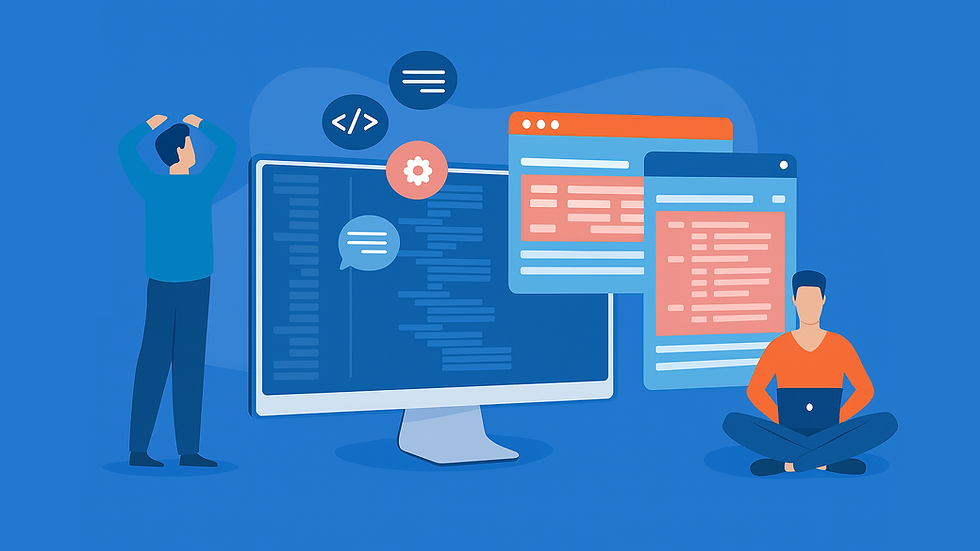- Shawn Smiley
- Oct 28
- 4 min read

Generative Artificial Intelligence is already redefining the Developer Portal experience. It’s changing how developers search, explore, and interact with API resources, turning static docs into dynamic, personalized interfaces. A successful API DevPortal should adapt to meet the evolving technological demands, keeping pace with new technology and recognizing a major shift: AI user personas.
AI-driven users change how content is consumed and what developers expect from a portal. In this blog post, the team at Apiboost explores what AI as a user persona is and how it influences Developer Portal experience.
What is AI User Persona
AI user personas aren’t science fiction. They’re real, active participants in how Developer Portals are used today. While traditional personas represent human users: frontend devs, DevOps engineers, product managers, AI personas represent tools that act like users.
Think of it this way: developers used to search for answers. Now they ask AI. That AI then interacts with your portal, scraping documentation, interpreting metadata, extracting use cases, and surfacing context-aware recommendations.
And it doesn’t stop at passive consumption. With AI integration into developer toolchains via MCP or Agent-to-Agent protocols, DevPortals can now be extended into the environments where developers already work: IDEs, CI/CD pipelines, API testing tools. The portal doesn’t just sit on a web domain anymore, it travels with the developer, embedded in their workflow. This shift increases API adoption without forcing users to change habits or context-switch.
Treating AI as a user persona is foundational for future-proofing the Developer Experience (DX). You’re no longer designing just for people. You’re designing for the tools they trust to make decisions.
How AI Influences Human Users?
AI enhances, extends, and sometimes even directs developers’ decisions. Think of it as a cognitive extension of the user. AI tools are used to facilitate discovery and evaluation tasks for human users. By searching for a specific solution in a specific situation, they can save loads of time and effort a human user usually wastes navigating through irrelevant content, legacy information, and irrelevant processes.
This is distributed cognition in action. Developers aren’t working alone, they’re working with AI. This means that knowledge and skills aren’t confined to a single person’s mind, they extend across vast datasets and external knowledge sources of AI agents.
Imagine a developer working on a new integration and unsure which endpoint suits their use case. Instead of manually scanning pages of documentation, they ask an AI assistant embedded in their IDE. The assistant parses the project context, queries the portal in real-time, and returns a specific endpoint recommendation with usage examples and known limitations.
AI influences how human users discover, validate, and build. The faster you adapt your portal to support this collaboration, the more indispensable your API becomes.
→ Read more: How AI Is Reshaping the Developer Portal Experience
How AI User Personas Are Related to Developer Portals?
Such collaboration between AI and developers reshapes Developer Portal expectations. If your portal doesn’t support AI-assisted workflows, you’re failing to meet the new baseline for developer experience. The AI now acts as a proxy, consuming and interpreting your content on behalf of the developer.
Let's take a look at how AI User Personas are related to DevPortals in more detail.
GPT-Based Documentation Assistants
GPT-based assistants are devs’ copilots. Software engineers use generative AI agents to explain parameters, generate code snippets, or summarize long-form API guides taken from DevPortal support channels. Clean, tagged, and well-maintained documentation helps GPT-based assistants better interpret the content, especially for junior developers or cross-functional teams with less API familiarity.
AI Integration via Developer Toolchains
With AI integrations via MCP or Agent-to-Agent protocols, developers can access Developer Portal directly from within their IDEs, CI/CD pipelines, or testing environments. This means your portal’s knowledge becomes available in real time to your agent workflows.
This expands the DevPortal’s reach into live workflows and makes the portal’s intelligence portable. It’s not just human users navigating your interface, AI agents are now embedded in the development environment itself, consuming your content, interpreting metadata, and accelerating decision-making in real time.
AI-Augmented Cross-Functional Teams
Cross-team users: PMs, solution architects, or technical marketers, now lean on AI to translate API functionality into user-facing features, marketable value, or stakeholder reports. They rely on AI to summarize complex flows, extract KPIs from API analytics, or generate competitive comparisons. Supporting this persona means your portal must surface business-level metadata, use case narratives, and outcome-driven insights alongside raw documentation.
AI-Ready API Documentation
AI tools parsing your content demand consistency, structure, and semantic clarity. Documentation must be machine-readable: predictable formatting, rich metadata, OpenAPI specs, response examples, and tagged content aren’t optional: they’re essential. Without properly structured content, your portal becomes unreadable to the very tools developers rely on to evaluate and adopt your API.
Apiboost Serves Both Human and AI Personas
To stay future-ready, Developer Portals need to serve both human users and the AI agents working on their behalf. AI user personas, such as search agents, documentation assistants, autonomous agents, and tool-integrated copilots, are now active participants in the Developer Portal experience. They consume content differently, demand structure, and act as intelligent intermediaries between your API and API consumers.
Apiboost is a next-gen DevPortal platform built to meet the expectations of developers and the AI tools they rely on. With built-in support for structured content, OpenAPI integration, semantic search, and AI-ready documentation architecture, Apiboost helps businesses deliver a future-ready developer experience.
Ready to build a Developer Portal that speaks to humans and AI? Talk to us about how Apiboost can accelerate your API strategy.








